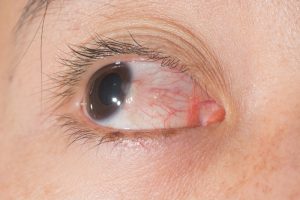
If you spend a lot of time outdoors, chances are you understand the risks that the sun poses to your health. While a daily dose of sun (and the vitamin D that comes with it) is known to make you happier and more active, there are a few things you should watch out for. Pterygia are one of them!
What is a Pterygium?
A pterygium is a fleshy growth that occurs on the surface of the cornea. Typically this growth is wedge-shaped and grows from the corner of the eye towards the pupil. While pterygia are pretty harmless, it can cause irritation and even obscure vision if it grows far enough.
Pterygia are very common in people who spend a lot of time outdoors. Why? Well, excessive exposure to ultraviolet light can cause abnormal cell growth. This is why farmers, surfers, and avid beach-goers commonly visit our office!
Pterygia symptoms include:
- Grittiness, or the feeling that there is something in the eye
- Redness and inflammation
- Dryness
- Blurry vision
- Obscuring of vision
Pterygia can be treated through medication and surgery, depending on how progressed the growth is. However, we think prevention is the best treatment! So, how can you protect your eyes from pterygia?
Wear Sunglasses!
This may seem like the most obvious answer. And while most people DO wear sunglasses outdoors, they aren’t always the right ones. Not all sunglasses were created equal!
When choosing a pair of sunglasses, be sure to check that they offer 100% UVA/UVB protection! If you cannot find a label that says this, they offer no protection and you might as well be wearing no sunglasses at all. For those who work outdoors or like to be outside for a large portion of the day, go for close fitting, wraparound style sunglasses for the best protection.
Avoid Smoke, Dust, Wind and Chemical Pollutants
Aside from the sun, another cause of pterygia is exposure to environmental irritants. When things such as smoke, dust and chemical pollutants enter the eye, they can cause irritation and pterygia growth. Be sure to wear work-appropriate eyewear to keep your eyes safe from irritants!
There are ways to prevent pterygia, but they are not realistic for everyone. If your job or hobby requires you to spend a lot of time outdoors or to be exposed to sun or irritants, you may still develop pterygia. If you do, don’t worry. Dr. Ellis is here to help!
If you have a pterygium and want to know your options, contact an Ellis Eye location in San Jose, San Francisco, Walnut Creek and more to schedule your appointment!


